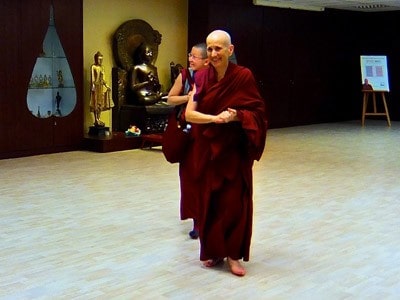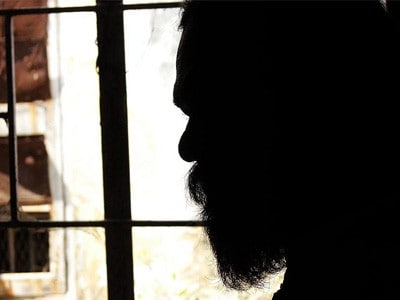Keeping balance
By W. P.

W. P. shares about the frustration that can arise when changing one's focus from self to others and provides helpful resources for those who might feel discouraged.
Many people meditate to gain greater awareness or to become enlightened. Some just want inner peace and a feeling of well-being. Regardless of what motivates them, little thought is given as to what life will be like as their awareness increases. They fail to realize that many of their hopes and dreams are fantasies and delusions. They do not understand that their fantasies and delusions will fade away as their awareness and insight increases, causing an inner emptiness. Before long they may feel like their life has no direction, or meaning, and just want to give up.
This is a deadly trap. It is one that I have fallen into myself, and I’m just now escaping its grip (though it seems like I had to chew my own leg off to escape). As my mind became more concentrated and still, my sense of self-importance began to fade. I began to see that most of my actions were fueled by habits and the image that I had of myself. I realized that very little I did was altruistic or even beneficial to myself, so I started weeding out my bad habits and senseless activities until one day there wasn’t much left to weed out, beneficial or harmful. Almost every activity seemed to be senseless or harmful, and life was completely empty. I became frustrated trying to occupy my days. My nights became a constant battle to keep my sanity as my head would ache (more like a throbbing in my mind) from both the frustration and the emptiness I felt. Sometimes it would get so bad that I would lay in bed curled up in a ball, gritting my teeth against the pain, until sleep finally came halfway through the night. I became so unattached to life at times that I didn’t care if I got out of prison or even lived. Nothing mattered anymore. I didn’t care if I got letters from my family or friends, and would actually hope I didn’t so that I wouldn’t have to write them back. I would keep to myself and avoid conversations, and I basically wished it would all just come to an end.
I wrote to Venerable Thubten Chodron and told her how I was feeling and she saw right to the heart of the problem. Here is what she told me:
It indicates that the uselessness of seeking happiness from external objects is sinking in, but finding the joy inside isn’t yet strong. You’ve understood that unproductive habits and emotions cause suffering and seen how much internal change is necessary to open our hearts and be genuinely altruistic. But you’re not yet content with taking small steps in the direction of love, compassion , and altruism, and wish that all the selfishness would just disappear immediately because freeing ourselves from it seems to be so mammoth.
So you see my problem was (and still is) that while I was overcoming my harmful habits and attitude, I wasn’t cultivating any beneficial ones. While I was practicing not causing harm to others, I was not doing what I could to be helpful.
Here is a story which also helped me break free. I read it in a book called The Gift of Well Being by Ajahn Munindo.
I heard a story of a young Westerner traveling around Southeast Asia who was particularly concerned that he didn’t join up with anything but the best tradition and so he proceeded to go from teacher to teacher conducting interviews with them. He asked each one in turn the question, “What was the Buddha doing under the bodhi tree?” I imagine he planned to compare all the answers and then make his choice. Each teacher naturally replied from their own perspective. The first, a Japanese teacher living in Bodhgaya said, “Oh, the Buddha was doing shikantaza.” Then another teacher said, “The Buddha was definitely practicing anapanasati.” Another replied, “The Buddha was doing dzogchen.” And further, “The Buddha was sitting in vipassana meditation.” When this seeker visited Thailand and asked Ajan Chan what the Buddha was doing under the bodhi tree, Ajahn Chan replied: “Everywhere the Buddha went he was under the bodhi tree. The bodhi tree was a symbol for his right view.”
This story helped to open up my narrow mind and see that I was taking one part of practice to the extreme while completely overlooking another essential part. And I also realized that I was grasping onto a theory about becoming enlightened and was being smothered by it.
Removing our attachments and cultivating our awareness and insight is not enough to free us from the grip of sorrow and suffering. Life will not become simpler and more joyful just by sitting in meditation, and meditation won’t automatically make us become this wonderful and compassionate person. More is needed.
Cultivating awareness and insight through meditation is very beneficial. It is the first step in overcoming our defilements, because we must first be capable of seeing them. Next we need to overcome them by cultivating compassion and kindness. This is the hardest part of practice for me, as I have kept to myself most of my life. However, what little compassion and kindness that I do show others has filled up the emptiness inside me and allowed me to continue on.
Incarcerated people
Many incarcerated people from all over the United States correspond with Venerable Thubten Chodron and monastics from Sravasti Abbey. They offer great insights into how they are applying the Dharma and striving to be of benefit to themselves and others in even the most difficult of situations.


